Anderson .Paak
Interview by Talib Kweli
Images by Jan-Willem Dikkers
Video by Rafiki Creative
Styling by Lisa Mosko
Grooming by Shannon Pazzetta
Special Thanks to Milk Studios, Los Angeles
“I’ve done so many different records.
It’s been over 10 years now, and it feels like every fucking
—Anderson .Paak album has been a debut album.” — Anderson .Paak
ANDERSON .PAAK
Anderson .Paak is a rapper, drummer and producer from Oxnard, California, who is now based in Los Angeles. Paak previously recorded under the name Breezy Lovejoy, releasing O.B.E. Vol. 1, and adopted his new moniker with the release of Venice (2014). He has also released music as NxWorries with Knxwledge and was invited to perform on Dr. Dre’s 2015 studio album, Compton, due to this collaboration. Paak signed to Dr. Dre’s Aftermath Entertainment weeks after the release of his sophomore album, Malibu (2016).
Talib Kweli
Brooklyn-born Talib Kweli is a critically acclaimed hip-hop artist, entrepreneur and social activist. Kweli has released ten records as a solo artist and collaborations with Mos Def as Black Star and producer Hi-Tek as Reflection Eternal. Other collaborators include Kanye West, Madlib, Just Blaze, Pharrell Williams, Kendrick Lamar and many others. Kweli often speaks out against police violence and racial stereotypes. He runs the record label Javotti Media.
Knxwledge
A beatmaker and producer raised in New Jersey and Philadelphia, Knxwledge is now based in Los Angeles. He has produced for Kendrick Lamar on To Pimp a Butterfly, Joey Badass on 1999 and released dozens of remix and beat-tape collections on his Bandcamp, compiled on Anthology (2013). Knxwledge records with Anderson .Paak as NxWorries and released his debut album Hud Dreams (2015) via Stones Throw.
Stones Throw Records
An independent music label based in Los Angeles, Stones Throw was founded by DJ Peanut Butter Wolf in 1996 and is best known for its underground hip hop releases. Notable artists signed to Stones Throw include Aloe Blacc, Madvillain and Mayer Hawthorne, among others.
Dr. Dre
A rapper, record producer and entrepreneur, Dr. Dre is the founder of Aftermath Entertainment and Beats Electronics. He began his career as a member of Compton rap group N.W.A. and released his first solo record, The Chronic in 1992. He followed up with 2001 (1999) and Compton (2015) and has won six Grammys since 1994. Dr. Dre has been instrumental to the careers of many rappers, including 2Pac, Snoop Dogg, Eminem, Xzibit, 50 Cent, The Game and Kendrick Lamar.
Last year, Anderson .Paak was credited on six songs on Dr. Dre’s Compton (though his vocals appeared on more) and began his meteoric rise as one of the most exciting talents in hip hop. He had been struggling in the underground LA music scene for years—cutting his teeth, learning his craft, starting a family and going broke—before this breakthrough. A drummer, producer and vocalist with roots in the Baptist church, Paak began recording over a decade ago as Breezy Lovejoy, then as Anderson .Paak and one half of NxWorries with producer Knxwledge. His sound assembles influences from the 1960s and ’70s alongside his childhood heroes—a sampling of 20th century touchstones from Al Green and Curtis Mayfield to Timbaland, Aaliyah, D’Angelo and Tupac.
Layered with Paak’s warm, soulful voice, the result is an auditory time capsule through a modern lens. This cross-generational sound is what has attracted—and confounded—his contemporaries; what caught Dr. Dre’s attention when he heard “Suede,” Paak’s 2015 single with NxWorries. Paak recently signed with Dre’s Aftermath Records and released his sophomore album Malibu (2016), which features his band The Free Nationals and industry heavyweights including Talib Kweli, The Game and ScHoolboy Q.
While in Cincinnati for a show, Paak talks with Kweli over the phone about music nostalgia, dream collaborations and what’s coming next.

Talib Kweli: The first Anderson .Paak record I heard was “Suede” and I thought you were a group because Anderson .Paak sounds like two last names. I heard it in a DJ Jay Rock mix. He’s a tour DJ with [my group] Black Star. What I know about Jay Rock is he doesn’t fuck with new shit. He’s someone who’s very serious about his music and is not listening to something because it’s trendy, so when I heard “Suede,” I’m assuming this is a record from someone my age who I missed. The lyrics, the flow—you were talking about Barry White, so I’m like, “Clearly it’s not a young person. This record sounds too good.” But people were like, “It’s Anderson .Paak.” So I realized it was a new thing, but I still thought it was somebody who was old. What was I hearing?
Anderson Paak: It’s interesting that you say you thought it was a group because that song was the first thing we put out under my other group NxWorries. I do all the vocals and the producer, Knxwledge, does all the beats. “Suede” was one of our first collaborations. I grew up with my mom listening to ’60s and ’70s soul music—one of the first memories I have is listening to Curtis Mayfield, Al Green, watching Super Fly. When I started working with Knxwledge, I was used to working with live musicians and producers that utilize newer sounds. It was the first time I worked with someone sample and loop-based whose production style is so minimal. Sometimes it’s just four bars of something, and it’s so infectious that it doesn’t get tiring. It’s so solid and soulful. When he gave me that batch of music, I automatically channeled this ’60s era. I felt like I was in a movie with hella leathers and candy paint and wood grain.
“I grew up with my mom listening to
’60s and ’70s soul music—one of the first
memories I have is listening to Curtis
Mayfield, Al Green, watching Super Fly.”
— Anderson .Paak
I wrote that whole song in the car while I was picking up my son and doing errands. I used to live with a producer named Shafiq Husayn, and he would tell me code names for different drugs. “You want two tickets to the Barry White show?” means you want two baggies of cocaine. I thought that was cool. A lot of the stuff in that song—the references and even the hook, “If I call you a bitch, it’s cause you my bitch”—are all phrases that I heard growing up, from my uncles, even in church. I played drums in the Baptist church for years and years.
TK: It’s also your terminology that made me think you were older.
AP: I think it was a natural thing, man. I had never done much stuff like “Suede.” I was playing with it a little in my solo work, but since we were forming a new group, I felt comfortable going 100% into it. NxWorries had another dimension. It was really refreshing for me.
TK: It’s a theory of mine that you grow up to do the music that your parents were fucking to. Kids my age, we grew up listening to soul records. That’s why my generation samples James Brown, Parliament, Roy Ayers. When I was a teenager, you had a Roy Ayers tape. That was the shit. Roy Ayers had all the hot samples from Tribe Called Quest and T-Rock records that we used to listen to back then. But I notice with kids now why Drake is so popular—his tracks are heavily influenced by the Timbaland, Aaliyah era.
AP: I had old parents, so that’s what it was. My mom is close to 70 years old, so she was not fucking with anything past Freddie Jackson. But I had older sisters who were into Pharcyde, Tribe Called Quest and East Coast stuff. We live in Oxnard –
TK: I didn’t know you were from Oxnard until you just said it, and now it makes sense why you were in the Jay Rock mix. He’s so connected with that Oxnard sound.
AP: Yeah, Madlib and everybody else. It was a big deal for me to be able to do something with Stones Throw [Records]. I wanted that more than anything. I never thought about working with Dre or Aftermath or anything—that was too far-fetched. But when I found out Knxwledge was on Stones Throw, I was bugging him to play “Suede” for somebody over there. That was big, to be part of that lineage.
But Ginuwine, Aaliyah and Timbaland were what I loved growing up. So when I really became a fan of music, even when I was getting into production, that’s who I was looking up to. It’s interesting to me the position I’m in now, where I have a lot of old influences. All these influences that kids are pulling from now, I remember when that stuff was actually coming out. I was in high school, but I remember Aaliyah from the jump. Even Tupac and Biggie—to be around for that—these kids weren’t around. And it’s moved to the 2000s now.
TK: Ja Rule music is the nostalgic throwback now. These younger artists—younger than you—they’re gonna be like, “Remember when Ashanti and Ja Rule were crackin?” I remember when Ja Rule was on the radio and New York was mad because he made a big pop record. I remember saying to people—because I remember the same thing happening with Puff and Big—“Wait 20 years. Ya’ll are going to be happy to hear these records.” The same way real hip-hop heads right now are listening to Big and Wu-Tang—they were dissing them back then because they were too big. You go to an underground hip-hop party and hear “Mo Money Mo Problems.” No underground people were fucking with Mase, but on some throwback it’s like “Oh, yeah!”
“It’s a theory of mine that
you grow up to do the music that
your parents were fucking to.”
— Talib Kweli
It’s interesting you mention Tupac because your style is also definitely rap-influenced and Pac was one of the first rappers who was really hard but had a sing-songy style. I hear his influence on you.
AP: That’s so important to me, man. That’s what I come from—Pac’s use of tone and the way he stretched out shit. Even Biggie was really good at tone and cadence too. Those were the rappers that grabbed my ear. I come from drumming too, so cadence and all that stuff were what I grabbed ahold of even before lyrical content, which is something I really, avidly had to work on.
TK: I hear a lot of young Mos Def in what you do because he has those natural tones. Your work inspires me because I’m the opposite of that. I’ve got lyrical content in my head all day. I have a naturally melodic flow, but I’ve gotten better through the years. I was listening to some of my earlier stuff today, and it was making me cringe. To be able to have it naturally… I know it’s organic, but you probably had to work on it.
AP: I’ve done so many different records. It’s been over 10 years now, and it feels like every fucking album has been a debut album. That melodic thing, that was trial and error. I was just rapping and not paying attention to melody. Working with different producers and doing more and more records, I was like, “I’m more interested in seeing where I fit on these tracks. I want to be another instrument in this beat.” I didn’t want to stop people in their tracks, trying to digest all these lyrics. I want them to still be grooving, but I don’t want to sacrifice the lyrical content for that. If it’s a dance track or even a song like “Suede,” I want the fucking tone to be so dope that they’re bouncing, then halfway in they’re like, “What this nigga say?”
TK: I wanted to thank you for having Reflection Eternal—me and Hi Tek—on your record. We’re not on the same song, but it’s big to me.
AP: It was huge when you agreed to do that, man. It was just the cherry on top.
TK: I never got the chance to chop it up with Dre until this summer. I have all these good relationships with people in the Dre camp, so I’ve been hearing your name, but had never met you. I followed you on Twitter and was like, “He’d be perfect for my album.” I hit you up, and you were like, “I got us all ready to go right now.” I knocked the track out while the tour bus was going. The record is fantastic. It’s one of my favorite records in a long time.
AP: I can’t wait to do it live, man. That’s going to be a moment. It’s crazy because the songs with you and Hi-Tek are the last I did for that album. I had slept on that beat that Hi-Tek sent me at first. It almost didn’t even happen because I wasn’t mastered. I like to push it ’till you literally can’t push it anymore. That song and yours, I rounded those up way later, and they’ve ended up being some of the most popular joints—”The Dreamer” and “Come Down.”
TK: In my career, it’s always the last two on the record that resonate with people. At that point, you’re recording with the vision of the album in mind.
AP: You’re seeing it way clearer at that point.
TK: Filling in the blanks. You know what the album needs. Who are some of your favorite producers? You produce too, right?
AP: I do produce. I’m like Dre with it—usually when I produce, I like to do the drum track. I work with my band usually—my guitar player Jose [Rios], bass player Kelsey [Gonzalez], and piano player Ron [Jerome Avant]. I build tracks with my musicians and steer them toward the vibe I’m looking for.
TK: I can imagine that as a drummer, producing tracks probably comes a little more naturally. Because I know a lot of musicians and all of them do tracks, but not all of them are tracks that I want to work with as a hip hop artist.
“I never thought about working
with Dre or Aftermath or anything—
that was too far-fetched.”
— Anderson .Paak
AP: Working with producers has really helped me because I learn a lot from them and see what I sound best on. It’s tough to be what I want for my album. I love working with producers who know how to utilize a lot of space, like Hi-Tek and Knxwledge. Very minimal. Another super talented producer is Pomo. He did the dancier groove “Am I Wrong.” Kaytranada also knows how to utilize space. He was on my last solo album and this one too. He’s one of the younger producers whose sound is instantly classic. I’m about to go to the studio with this kid named King Karnov.
TK: He’s got some really, really nice tracks.
AP: Others are Pharrell, of course, and Premier. I did some stuff with Q-Tip recently. It’s gonna be dope. I wanna get with Pete Rock.
TK: God bless Q-Tip—he’s not in a very straight space right now, but his whole shit has been, “Come through. Come through the crib. Come through.”
AP: I was tripping being in the studio with him.
TK: He’s the greatest. Who would you most like to collab with and why? What upcoming collaborations are you excited about?
AP: I’m with D Prosper, and we’re in the studio working on another record. I’m still trying to finish up my verses.
TK: D Prosper knows where the beat’s at. I would go over to Lauryn Hill’s crib back in the day and Prosper would be sitting there. When 50 Cent was cracking, everyone was wondering how he was getting all those beats, and it turns out that D Prosper was the A&R at G-Unit.
AP: We were just chilling, smoking outside of Miss Lily’s, and he was like, “You should do some shit with Björk.” I was like, “Yeah. That’s it.” Her, Thom Yorke and Jack White. I’m just avidly working on the album right now. I’ve been getting an early start, so maybe I can be going through some of the cream of the crop by this time next year. I feel like it’s going to be a lot of group-based stuff on the next one. I want you to do vocals then have me come in here and there. Some high-level party stuff. We can try to get something in this summer.
TK: That sounds like a lot of fun.

Christophe Lemaire Pants courtesy of Please Do Not Enter, Los Angeles
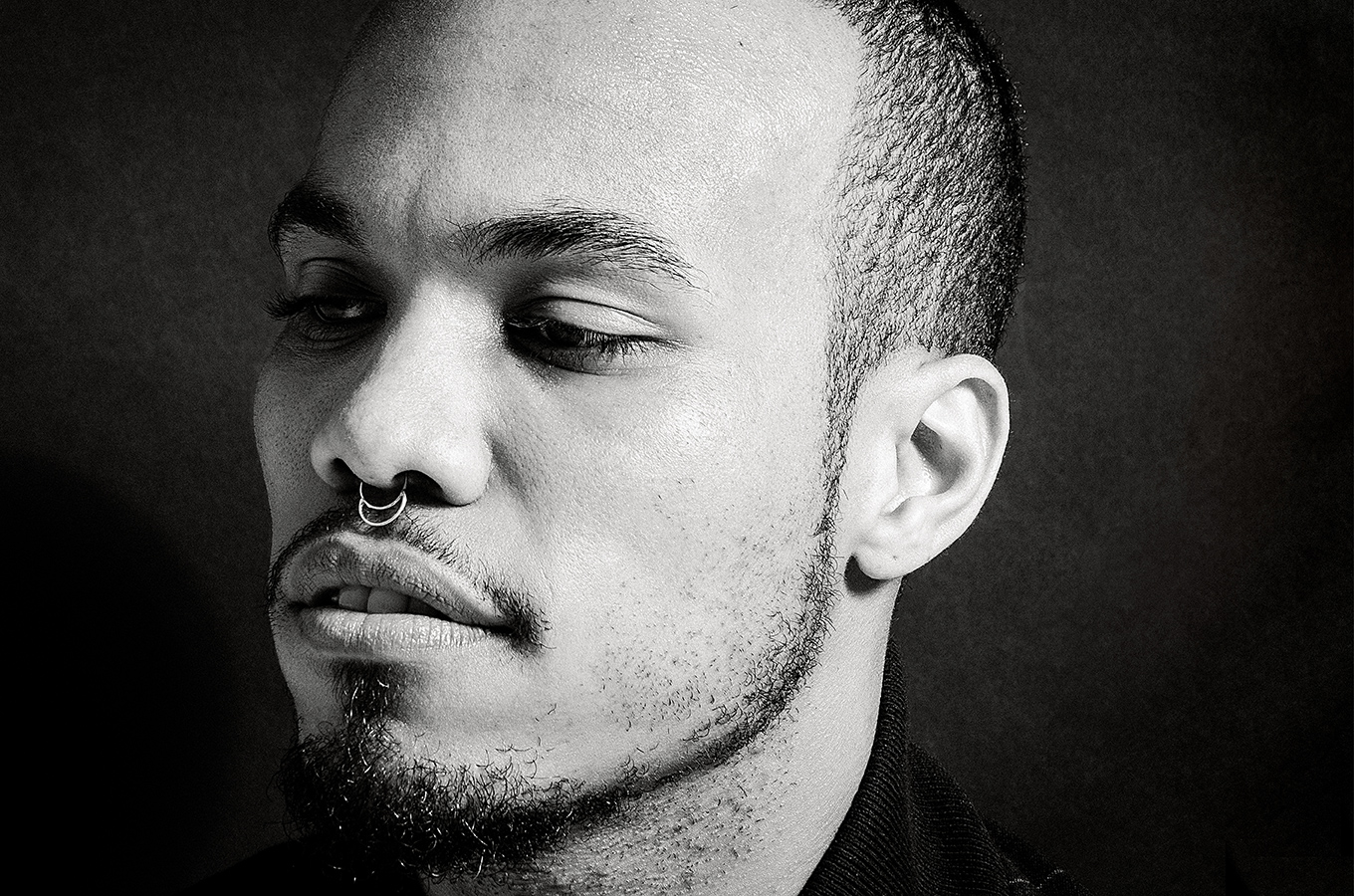
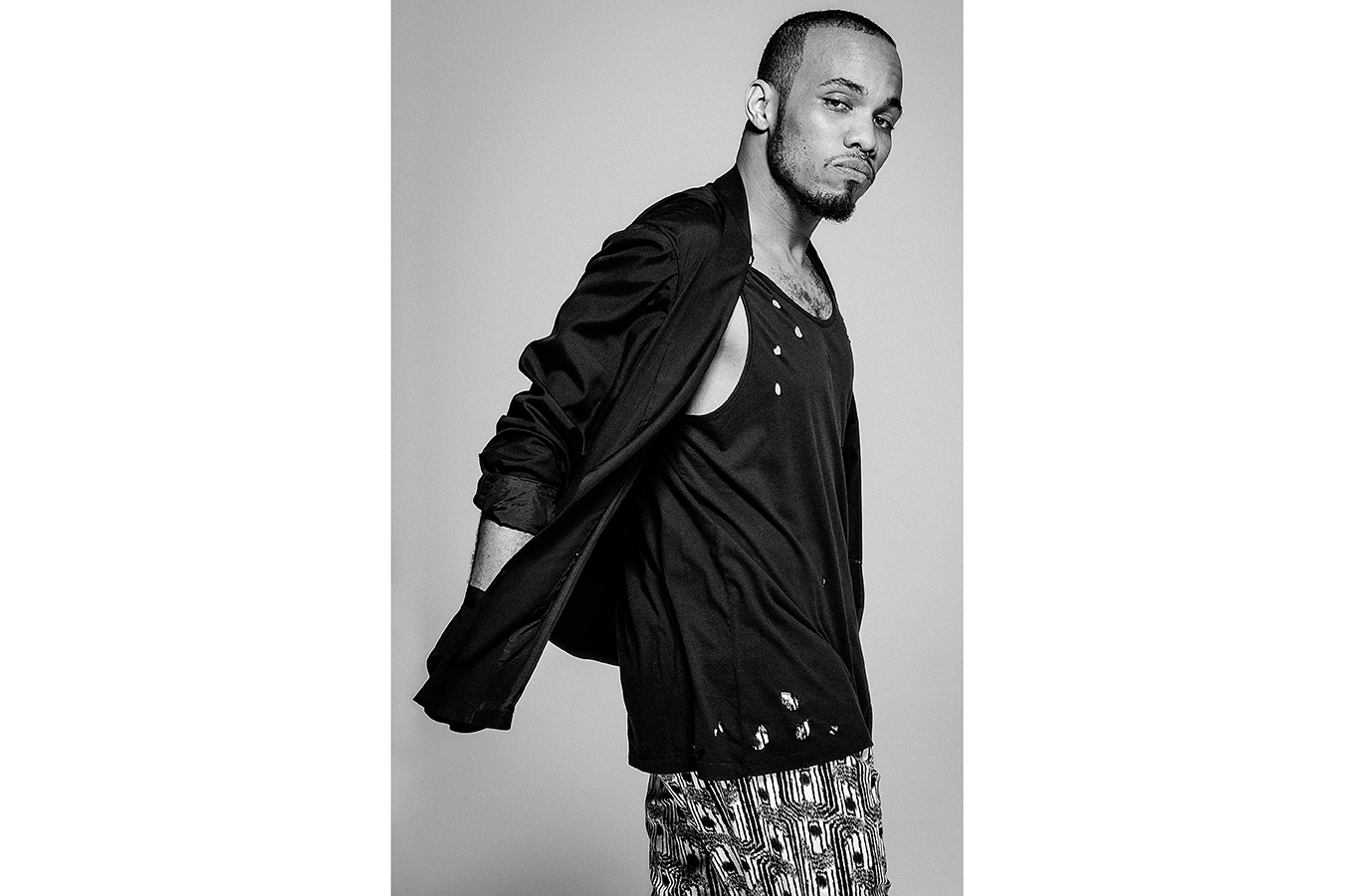
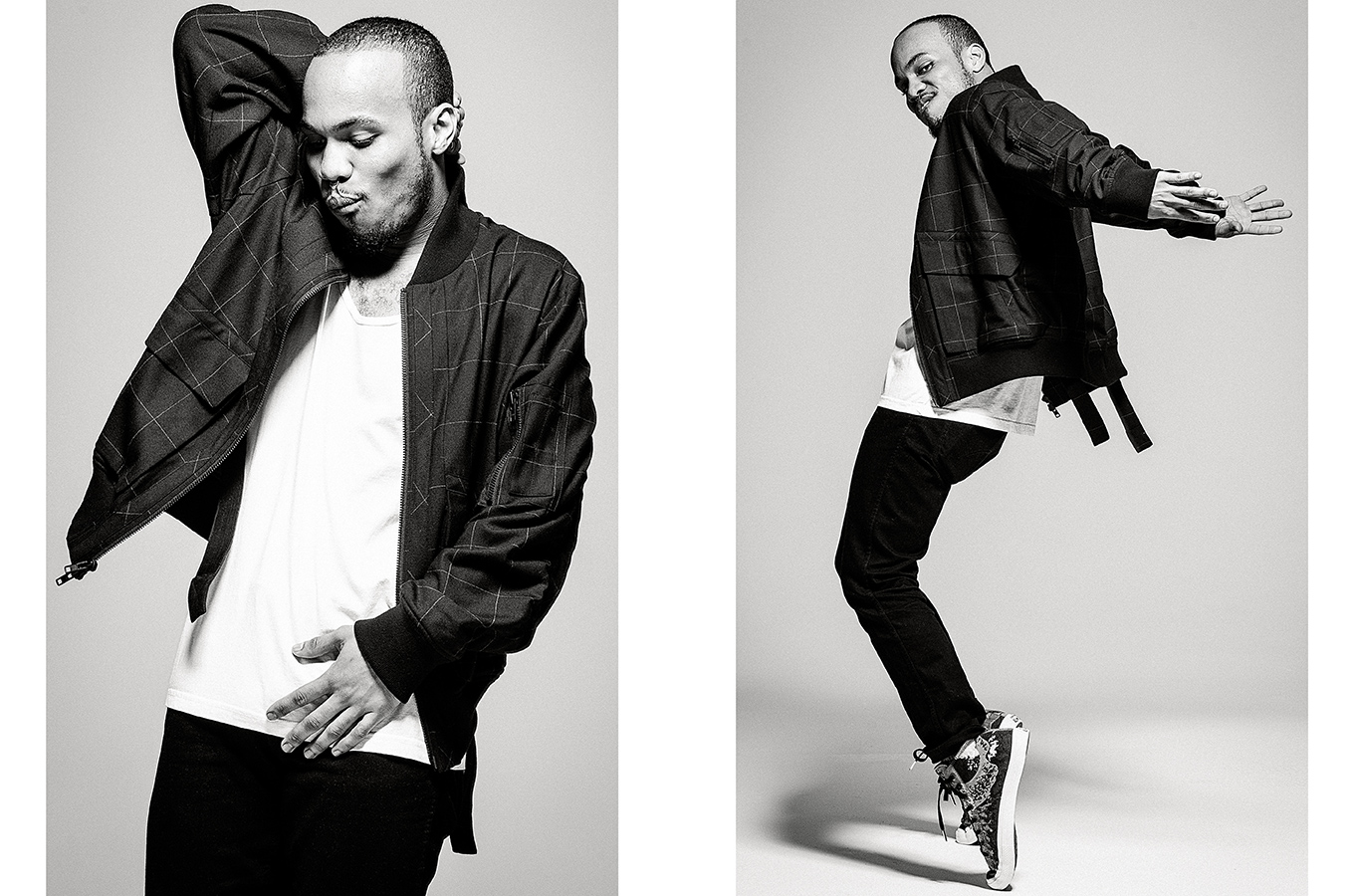
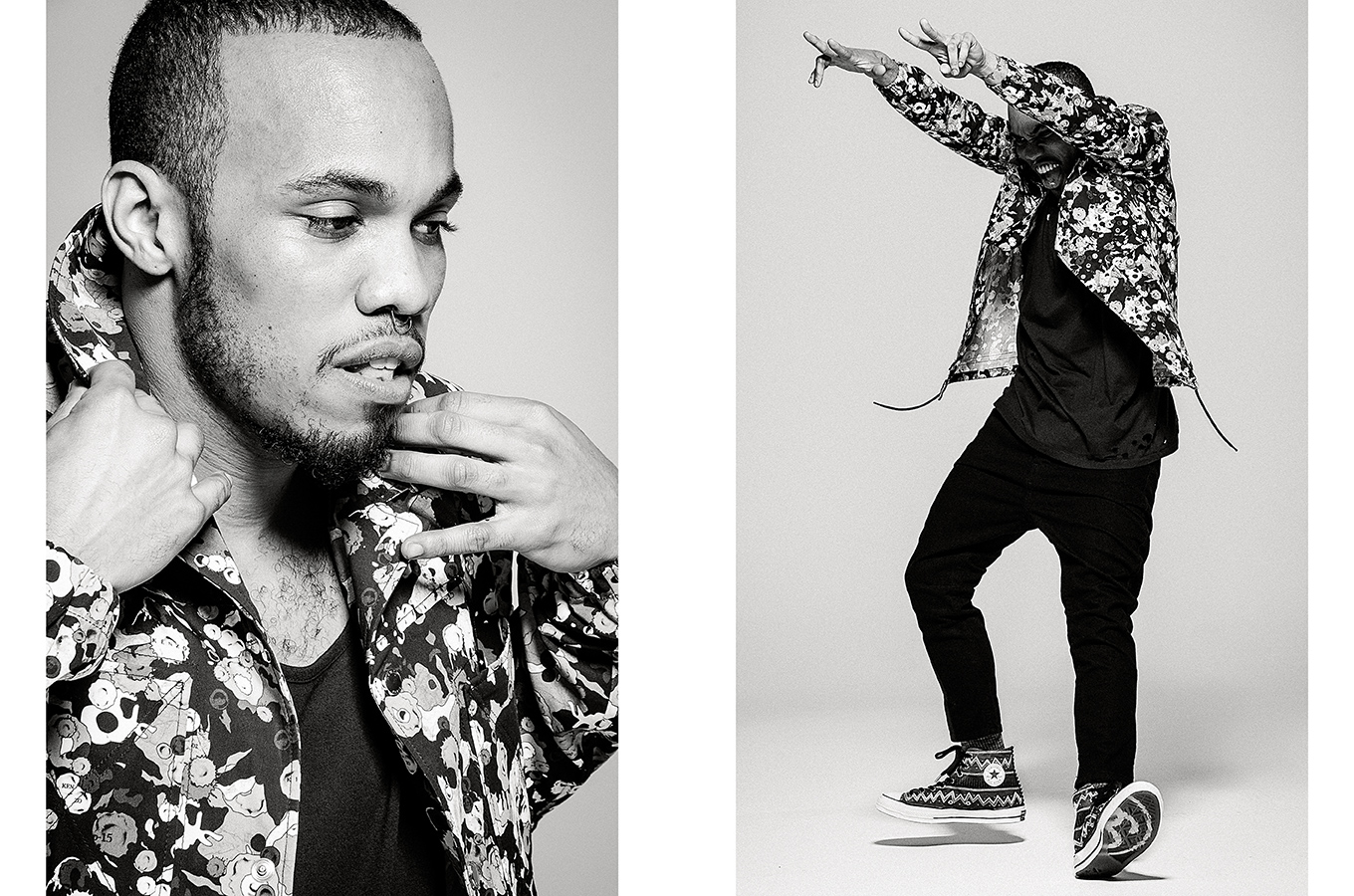
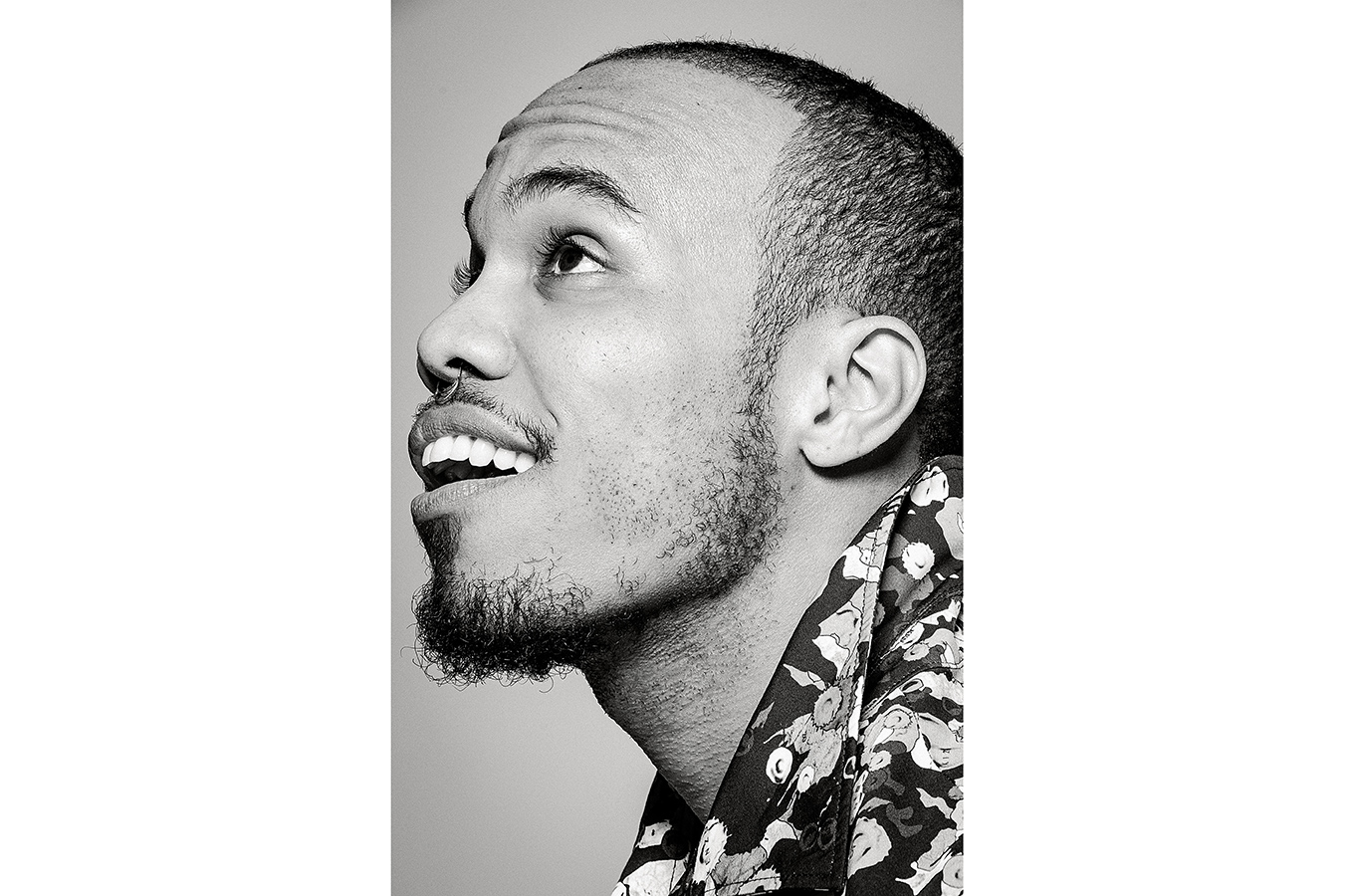
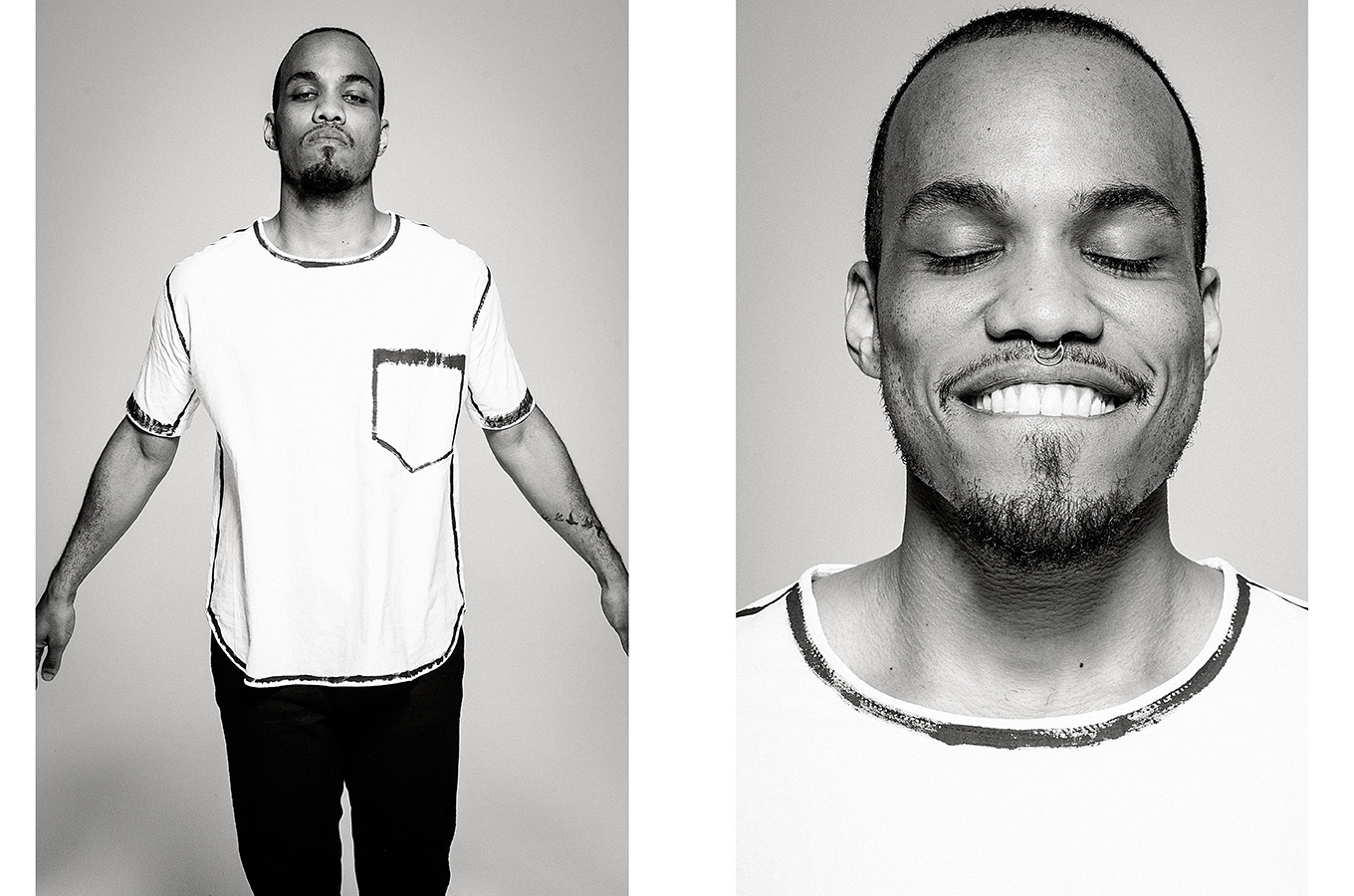
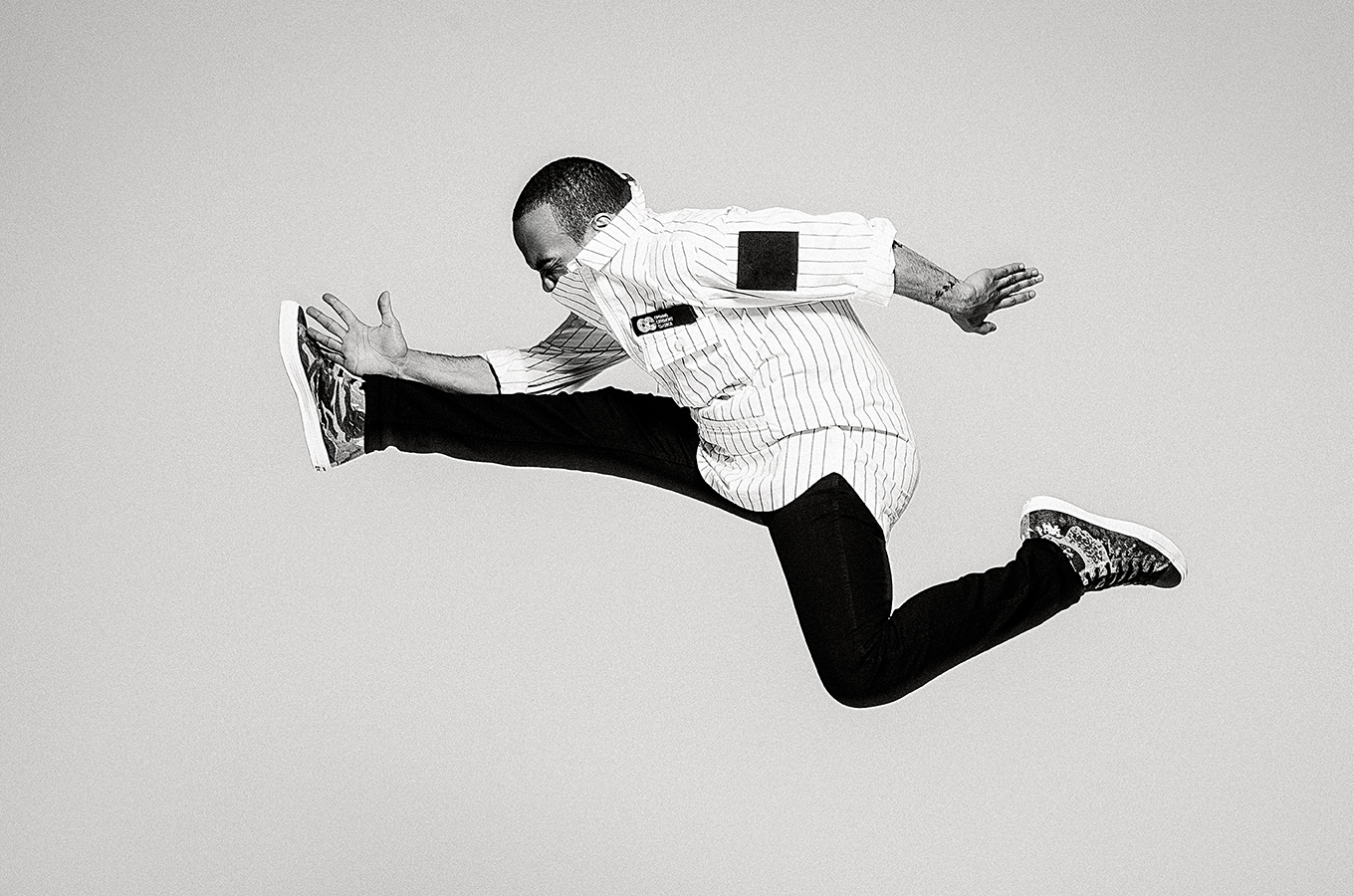
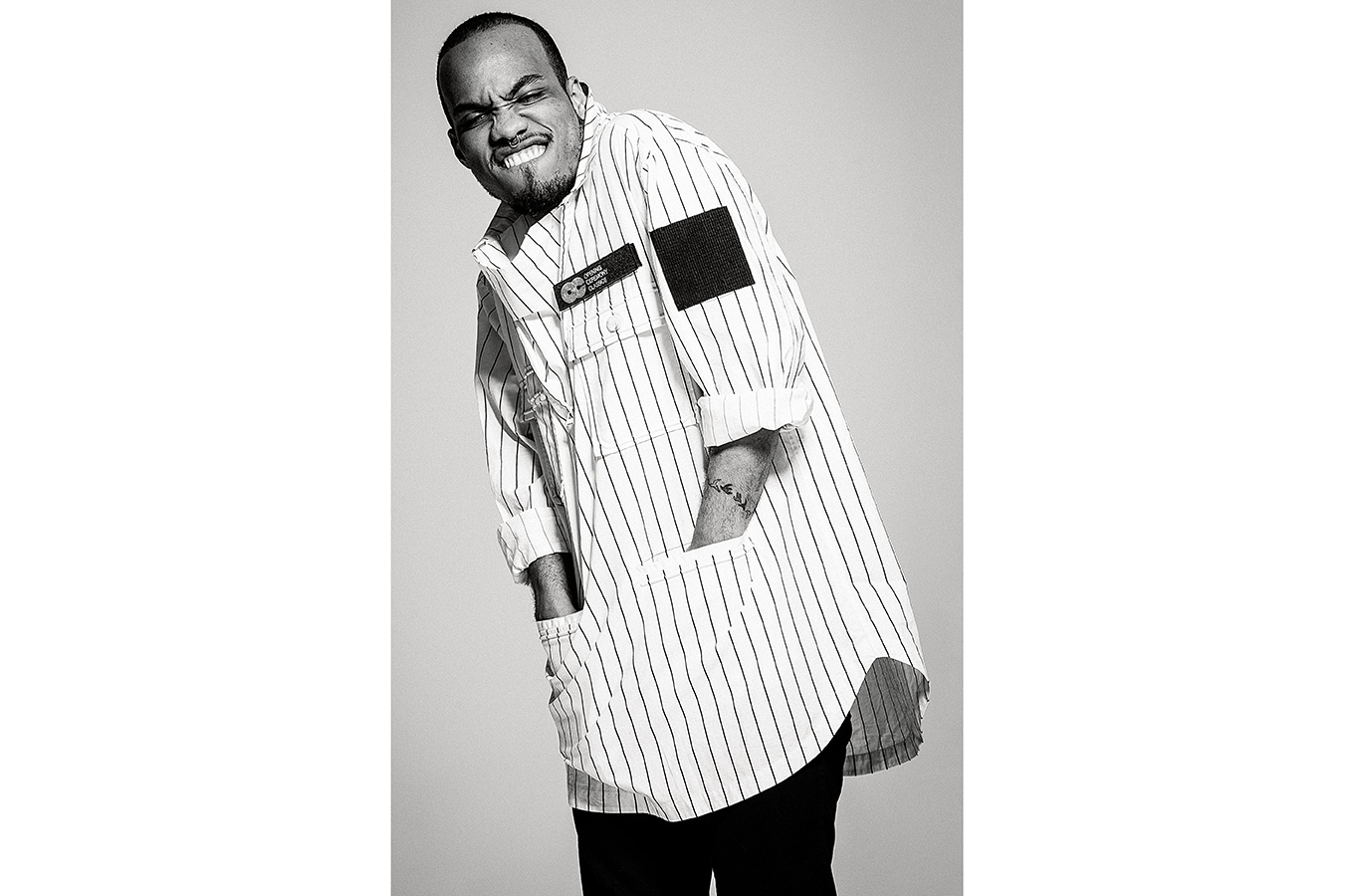
Behind the Scenes
Exclusive Live Performance of “Am I Wrong”





